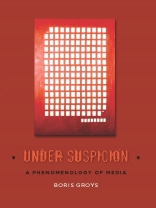The public generally regards the media with suspicion and distrust. Therefore, the media’s primary concern is to regain that trust through the production of sincerity. Advancing the field of media studies in a truly innovative way, Boris Groys focuses on the media’s affect of sincerity and its manufacture of trust to appease skeptics.
Groys identifies forms of media sincerity and its effect on politics, culture, society, and conceptions of the self. He relies on different philosophical writings thematizing the gaze of the other, from the theories of Heidegger, Sartre, Mauss, and Bataille to the poststructuralist formulations of Lacan and Derrida. He also considers media ‘states of exception’ and their creation of effects of sincerity—a strategy that feeds the media’s predilection for the extraordinary and the sensational, further fueling the public’s suspicions. Emphasizing the media’s production of emotion over the presentation (or lack thereof) of ‘facts, ‘ Groys launches a timely study boldly challenging the presumed authenticity of the media’s worldview.
สารบัญ
Translator’s Preface: Dead Man Thinking
Introduction
I. Submedial Space
1. The Submedial Subject and the Flux of Signs
2. The Truth of the Medial and the State of Exception
3. Media-Ontological Suspicion and Philosophical Doubt
4. The Phenomenology of Medial Sincerity
5. The Gaze of the Other
6. The Medium Becomes the Message
7. The Case of Exception and the Truth of the Medial
II. The Economy of Suspicion
8. Marcel Mauss: Symbolic Exchange; or, Civilization Under Water
9. Claude Lévi-Strauss: Mana; or, the Floating Signifier
10. Georges Bataille: The Potlatch with the Sun
11. Jacques Derrida: The Lack of Time and Its Specters
12. Jean-François Lyotard: The Roller Coaster of the Sublime
13. The Time of Signs
14. Suspicion Is the Medium
Notes
Index
เกี่ยวกับผู้แต่ง
Boris Groys is Global Distinguished Professor in the Faculty of Arts and Science at New York University and senior research fellow at the Academy of Arts and Design in Karlsruhe, Germany. A Russian émigré to Germany, he received his Ph.D. in philosophy from the University of Münster. His books in English include The Total Art of Stalinism: Avant-Garde, Aesthetic Dictatorship, and Beyond; Art Power; Going Public; and History Becomes Form: Moscow Conceptualism.Carsten Strathausen is associate professor of German and English at the University of Missouri-Columbia.












